This is the first part of my ‘Queer Theory’ series. I read a lot of material for these essays. This introduces what Queer Theory is. The next one will tackle its links to pedophilia. After that I will focus on the broader movement in academia and politics and its ideological preoccupations. Then I will return to the classroom and explore how these specific constructs and this vocabulary is being smuggled into schools by believers, and what has been society’s reaction. This is an interesting worldview and it’s one that our culture has been almost completely unwilling to discuss honestly.
Queer Theory is a branch of Identity Marxism: Queer Marxism, which takes “normalcy” as its special form of bourgeois property to abolish through (Queer) class struggle.
-
“Queer,” then, demarcates not a positivity but a positionality vis-à-vis the normative—a positionality that is not restricted to lesbians and gay men but is in fact available to anyone who is or who feels marginalized because of her or his sexual practices.
-David Halperin
If you asked Americans on the street, at random, you’d probably usually hear some guesses that “Queer Theory” has something to do with gay people. Maybe it’s a progressive idea about how to make gay and trans people equal(er)? Maybe it’s a historical notion that interrogates homophobic sentiments and legislation around the West in the early 20th century? Those guesses would be incorrect. Queer Theory is a conceptual framework that applies the Marxist view of evolving history and class struggle to the idea of normalcy, especial norms of gender and sexual desire. Queer Theory is a concerted struggle by the (self-proclaimed) abnormal and their allies to tear down ideas of normalcy and decency. This includes even linguistic consensus, traditional institutions, rules, and laws… including age of consent laws.
In 1977, along with Jean-Paul Sartre, Jacques Derrida, and other intellectuals, Foucault signed a petition to the French parliament calling for the decriminalization of all “consensual” sexual relations between adults and minors below the age of fifteen, the age of consent in France.
-Wikipedia
A similar letter was published in the paper Libération in 1979, supporting Gérard R., an accused child sex criminal awaiting his trial for eighteen months, signed by 63 persons, stating that Gérard R. lived with young girls aged 6 to 12 and that they were happy with the situation.
-Wikipedia
There’s a curious phenomenon on the Left: academics will openly discuss radical theory amongst themselves and their allies… and then repudiate or muddy the ideas when brought before the general public. That’s how ‘Anti-Racism’ has been permutated in the media into a general idea of Civil Rights or African-American history education (despite Anti-Racism being completely and implacably opposed to the goals of the Civil Rights movement and Act of 1964). Anti-racism is the idea that whiteness and our society are totally saturated with racism (white supremacy, specifically-other forms of racism being deemed invalid conceptions and unimportant) and that the only way for this great social evil to be addressed is for individuals and organizations to engage in constant self-examination, emotional display, and pro-minority racial discrimination. It is very definitely an ideology constitued against ‘whiteness’ (whetever that is). Its goals are contrary to federal law, majority opinion (including that of most black people), and the ostensible civic ideals of our government. But activists believe in Anti-Racism and they believe it so fervently because it is a moral, almost spiritual, view of the world. Belief compels action. What’s to be done? The answer is to present one watered-down view of Anti-Racism to the media and parents of schoolchildren… and secretly work toward another, truer version behind the scenes. This entails difficulties, for the texts of Anti-Racism are available to anyone-although they’re difficult to wade through and rarely advertised-but a pliant media and (until recently) willing and helpful technology and government complex made things easier. Most people will never seek the primary sources. For millions the name is enough. “Anti-Racism”? I’m against racism… and so all those strange and annoying characters fighting against Anti-Racism in our schools must be, in some suspicious sense, racist (or racist adjacent). Perhaps it’s just a Republican thing?
Repeating what is already learned can be comforting and therefore desirable; students’ learning things that question their knowledge and identities can be emotionally upsetting. For example, suppose students think society is meritocratic but learn that it is racist, or think that they themselves are not contributing to homophobia but learn that in fact they are. In such situations, students learn that the ways they think and act are not only limited but also oppressive. Learning about oppression and about the ways they often unknowingly comply with oppression can lead students to feel paralyzed with anger, sadness, anxiety, and guilt; it can lead to a form of emotional crisis.
Once in a crisis, a student can go in many directions, some that may lead to anti-oppressive change, others that may lead to more entrenched resistance. Therefore, educators have a responsibility not only to draw students into a possible crisis, but also to structure experiences that can help them work through their crises productively.
-Kevin Kumashiro
Racism is a deeply emotional construct in our society, but there’s one that’s deeper: childhood innocence. If activists will dissemble and distract from the hostile and anti-white and anti-American aspects of Anti-Racism, how much more might they struggle to suppress pedophilic and predatory elements within their coalition? Actually, we don’t need to speculate. There are such elements, within Queer Theory.
We are guided by the following question: what might Drag Queen Story Hour offer educators as a way of bringing queer ways of knowing and being into the education of young children?
-Harper Keenan
Most people cling to their preconceptions. It is true that homosexuals used to be slandered and linked to pedophilia and child abuse in a way that was hateful and usually unfair. However, the situation these days is closer to this: there is a small but influential secret element online and in education actively seeking to sexually abuse children. This effort is apolitical and evil, and has little to do with Queer Theory, although the secrecy and confusion connected to Queer Theory can give predators excellent cover. There is another, much larger, cohort of Leftists and activist teachers, librarians, researchers, etc. who have a friendly view of Queer Theory. There are parents and conservative activists who want any mention of gender and sexuality to be kept out of elementary schools (which is fundamentally opposed to the ideas of Queer Theory) and want to remove books that they regard as pornographic and disorienting. The ‘grooming’ allegation has little to do with the predators and nothing to do with gay people. It’s the idea that there are educators trying to actively change the worldviews of their students and make them activists, and queerer. This is absolutely occurring, although in what numbers I cannot say. Activists use the old libel against gay folks to shield their current efforts of psychological influence and political instruction. What are these efforts?
Drag Queen Story Hour provides a generative extension of queer pedagogy into the world of early childhood education. Drawing on the work of José Esteban Muñoz, the authors discuss five interrelated elements of DQSH that offer early childhood educators a way into a sense of queer imagination: play as praxis, aesthetic transformation, strategic defiance, destigmatization of shame, and embodied kinship. Ultimately, the authors propose that “drag pedagogy” provides a performative approach to queer pedagogy that is not simply about LGBT lives, but living queerly.
-Harper Keenan
Queer Theory says that normalcy is an oppressive construct. It focuses particularly on sexuality and sexual proclivity and gender and regards social taboos around sex and personal behavior to be fundamentally unjust. The believers hold that a newer and better society will accompany the overthrow of these outdated and traditional norms. They believe that a loosening of ideas of sexual propriety and restriction would help everyone, and they draw no ideological distinction between “children” and “adults”. That’s not to say that every Queer Theory-friendly educator wants to defenestrate age of consent laws. Most probably do not. But it is a fact that the ideology is highly preoccupied with marginal sexual behaviors and gender expressions as useful rebellions against the norm (oppression) and that these norms should be weakened (liberation) and that children should be involved in this project to some extent. It is a basic and undeniable fact, as far as I can tell, that religious ideas of sex and gender, traditional ideas of man and wife, “heteronormativity”, public disapproval of paraphilias and fetishes, and the clear distinction between adult/child are all things that Queer Theory is explicitly and fundamentally opposed to, as concepts. This doesn’t mean that the Queer Theory-committed childhood educator will work to undermine family instructions about sex and sex roles and sexual propriety… but they will believe that such ideas should be undermined. And of course, some significant portion of those educators will try to undermine these ideas as they are taught by family and community. After all, this is a messianic and utopian vision which proclaims the way forward for society-a path to undo oppression and facilitate greater happiness and freedom. OF COURSE some of those believers will try to spread their beliefs. They, by definition, think they are true and right.
two teacher educators, who are also scholars in the field of critical discourse analysis…propose subverting rhetoric launched against social justice efforts—repackaging the Trojan horse and sending it back—in order to reconfigure language of inclusion/exclusion, equality/equity, and free/hate speech.
--Jonathan T. Torres & Nicole C. Ferry
I won’t try here to speculate about what percentage of Queer Theory-educators are invested in indoctrinating children with their ideas. If you watched the media these days you would probably assume that NO teacher is doing this, and that any hint to that effect is rightwing slander and “conspiracy theory”. But that would require one to believe that there is a popular and extreme ideology spreading through America’s teachers (which it is-Queer Theory is unbelievably popular in teacher education, probably more prominent there than any other part of academia save Sex and Gender Studies themselves) and that even though some of these teachers believe that they have correct and ethical beliefs about the evil and oppression of our society they are NOT influencing children to believe those things. This flies in the face of human nature and reflecting upon it should at least make us open to the possibility that Queer Theory is possibly, sometimes, being pushed onto kids. Our suspicions should grow when lessons incorporate the ideas and lexicon of Queer Theory, or when schools try to hide their instructional materials from parents, or when teachers instruct students to not tell their parents about certain things, or when teachers cultivate occult and extracurricular relationships with their students. All of these things have happened and are happening, as we will see.
Applying queer methods of analysis to studies of childhood can help to queer the rhetoric of innocence that constrains all children.
-Hannah Dyer
I make no claims about the scale of the problem or the effects. I don’t know what those might be. I do know what Queer Theory is (and soon you will too) and I know that it has very little to do with gay or trans people or their equality and I know that it’s not something that the vast majority of parents would want in their children’s classroom. The media is weakening but it still has considerable power and can successfully obfuscate many issues and debates. That seems to be happening here, across the board. All I ask is that if there are specific allegations of ‘grooming’ or indoctrination you don’t dismiss them out of hand. They could be true. They are happening. Much of this activity originates near Queer Theory.
In the next part of this series, I will explore the historical and ideological links between Queer Theory and pedophilia, which is a closely guarded secret on the Left. Most students (even those majoring in Queer Studies!) never learn this in college. It would be considered ‘disinformation’ by millions of believers across this country. Nevertheless… it is true.
For all the criticism teachers receive for ‘indoctrinating’ students, turning them into liberal-minded cry-babies, not much has been said in defense. At the very least, a shy denial is made. It is time for educators to own this criticism and admit that is exactly what we do.
-Jonathan T. Torres & Nicole C. Ferry
NOTE: Jonathan T. Torres and Nicole C. Ferry and Harper Keenan and David Halperin and Kevin Kumashiro are all, themselves, Queer Theorists. I have only consulted the actual writings and speeches of Queer Theory to research for this series.
Queer Theory is the Doctrine of a Sex-Based Cult
(
)




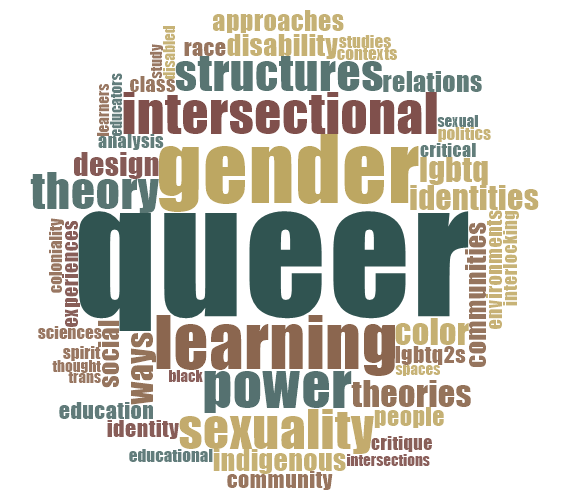

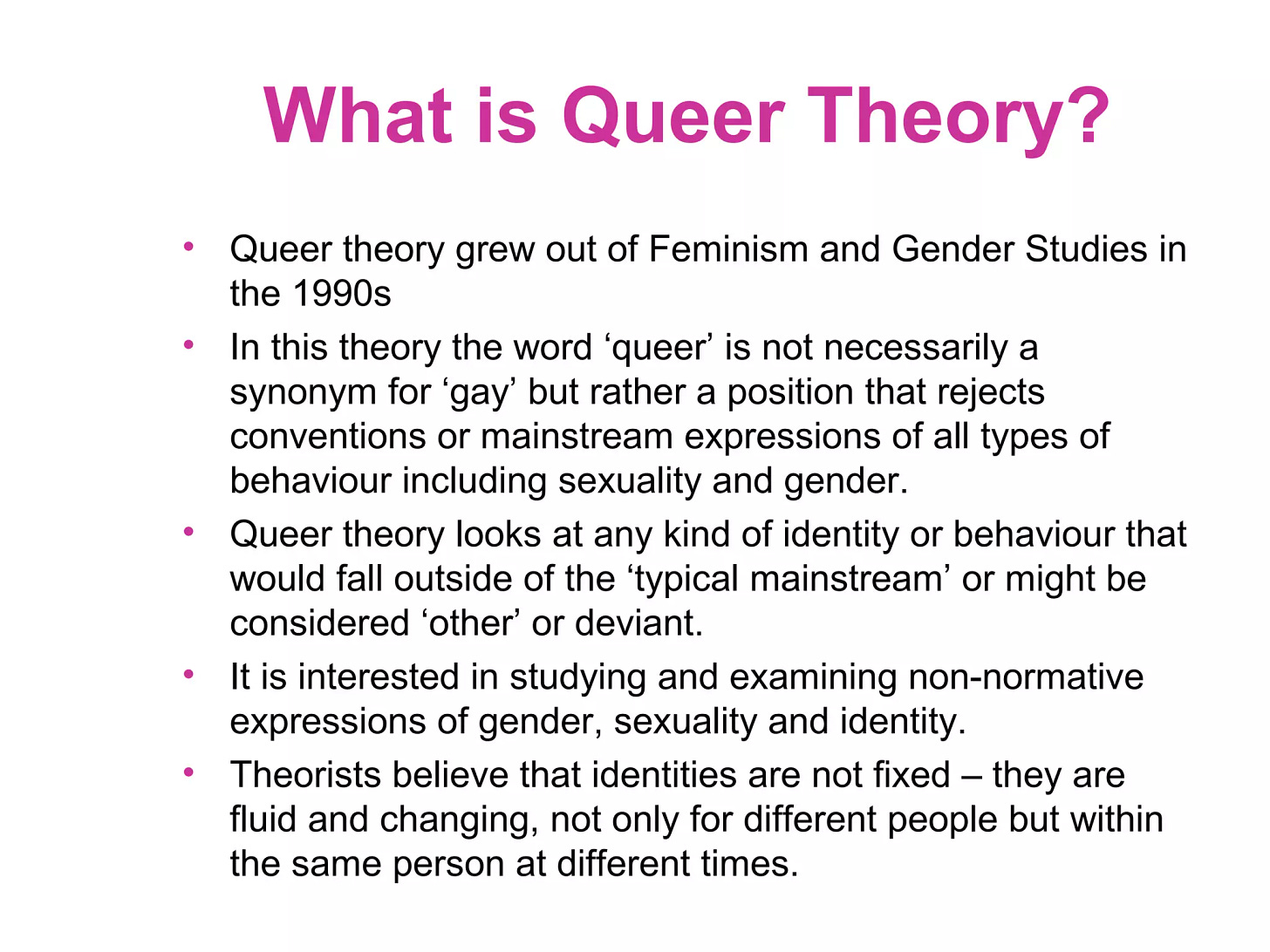
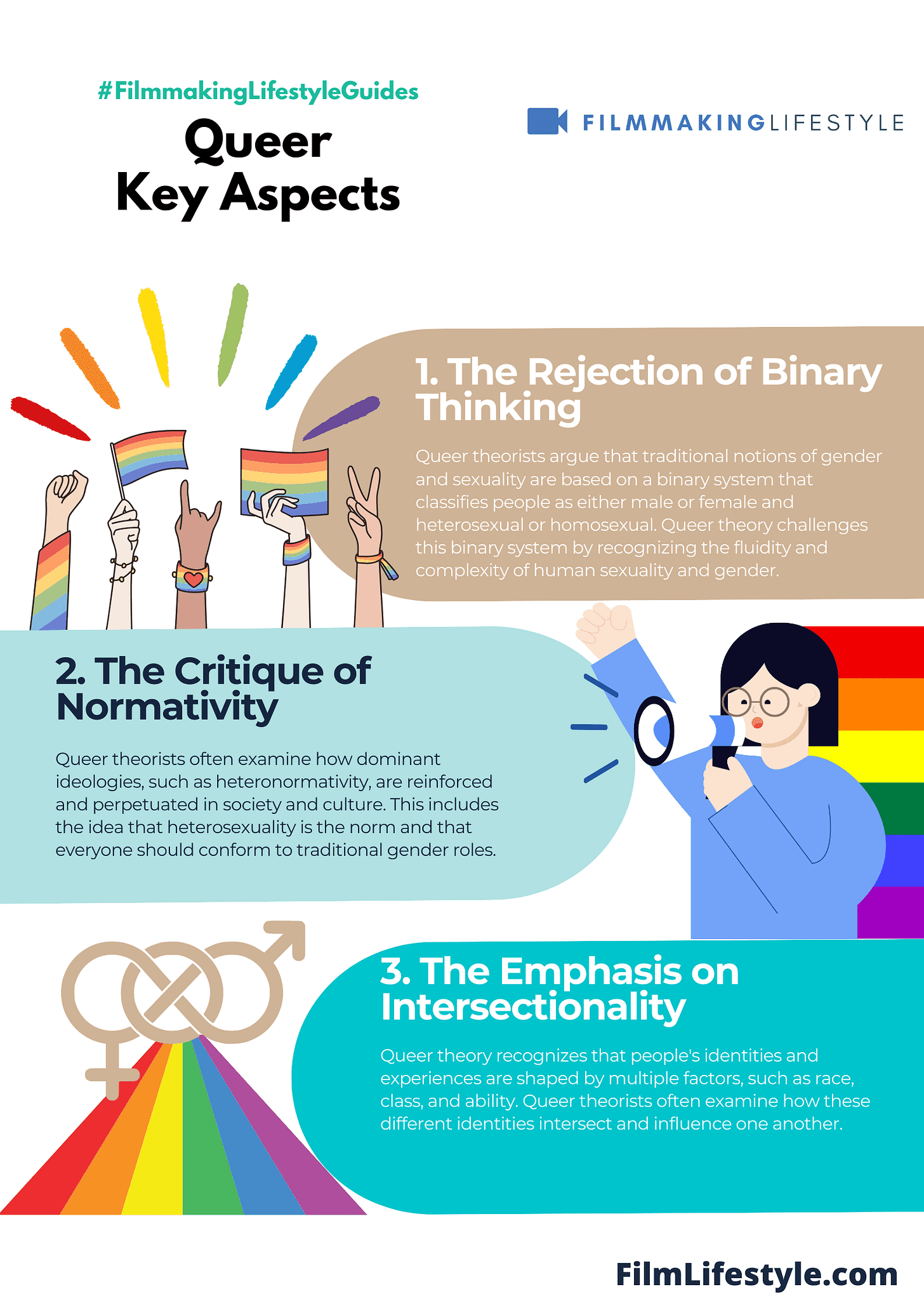
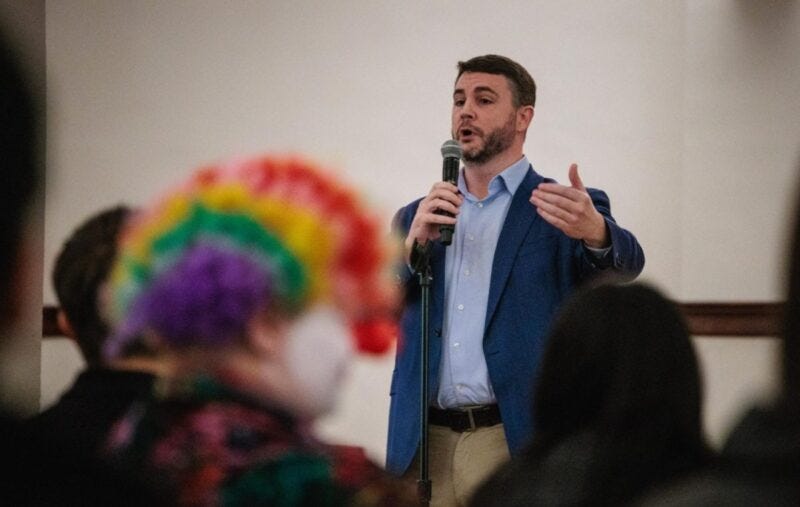
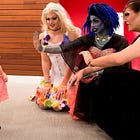
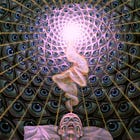
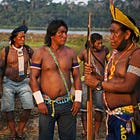

Wait until you get to the parts of Queer Theory about transitioning. They basically say "Yeah, it's a phase, but you need to play word games in your head with it so that you can cling to it as an oppositional queer tribal identity."
I say this because I read an essay a day or two ago that seemed to admit it. I could probably find it and link you if you want.